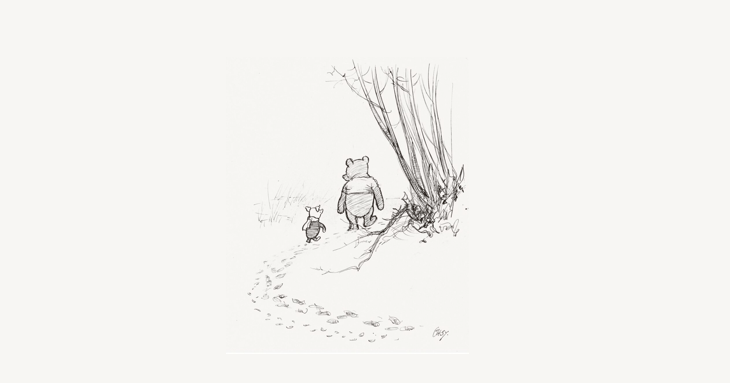
The Tao of Pooh: Simplicity, Wisdom, and the Way of Being
When Benjamin Hoff published The Tao of Pooh in 1982, he bridged an unlikely pair: A.A. Milne’s beloved Winnie-the-Pooh stories and the ancient Chinese philosophy of Taoism. On the surface, it seems like a whimsical mash-up. But at its heart, the book reveals a profound truth: the simple bear of little brain embodies timeless wisdom about how to live well.
Themes of The Tao of Pooh
1. Simplicity as Strength
The Tao, or “the Way,” emphasizes harmony with the natural flow of life. Pooh exemplifies this by being content with who he is, unconcerned with cleverness or complication. Where Owl chases knowledge and Rabbit schemes, Pooh remains steady in his simple joy—often arriving at the right solution by not overthinking.
2. Wu Wei — Effortless Action
A central Taoist principle is wu wei, or “effortless action.” It doesn’t mean passivity, but rather aligning with the natural course of things instead of forcing outcomes. Pooh doesn’t fight against life’s currents—he hums, wanders, and somehow finds his way exactly where he needs to be.
3. The Value of Emptiness
Hoff reminds us of Taoist teachings about emptiness: a jar is useful because of the space inside it. Pooh’s “empty-headedness” is not foolishness, but openness—space for wonder, joy, and clear seeing. His mind is uncluttered, which makes him receptive to the world around him.
4. Harmony with Nature
The Hundred Acre Wood is more than a backdrop—it’s a gentle metaphor for living in tune with the rhythms of life. Taoism emphasizes naturalness (ziran), and Pooh embodies this by appreciating simple pleasures: a pot of honey, a walk with friends, the turning of the seasons.
Taoism: Philosophy, Spirituality, or Both?
Taoism is not easily confined to a single category. It is at once a philosophy of life and a spiritual tradition. Philosophically, it offers insights about balance, humility, and the futility of overcomplicating things. Spiritually, it points to the Tao itself—the ineffable Way that underlies and sustains all existence.
In the Tao Te Ching, the Tao is described as the source of the world, beyond language and thought. This dimension of Taoism goes beyond practical advice and touches on the sacred, encouraging harmony not only with nature but with the deeper patterns of existence.
The Tao of Pooh focuses mainly on Taoism’s practical and philosophical wisdom. Benjamin Hoff doesn’t dwell on Taoist rituals, meditation, or mysticism. Instead, he highlights Taoism as a way of living simply and authentically. Still, the book gestures toward the Tao’s spiritual dimension in its emphasis on openness, wonder, and trust in the unseen flow of life. In this way, Pooh becomes not only a teacher of simplicity but also a quiet spiritual guide.
Why the Book Resonates
At first, Hoff’s book seems like a playful reinterpretation of children’s stories. But its enduring popularity shows that it speaks to a deeper cultural hunger. In a world that prizes busyness, achievement, and intellect, The Tao of Pooh offers a reminder that life is not meant to be forced or overcomplicated. Pooh’s charm is his authenticity. He doesn’t try to be more than he is, and that is precisely why he is at peace.
The book’s accessibility also matters. Taoist texts like the Tao Te Ching can feel abstract or paradoxical. Hoff’s use of familiar characters makes the philosophy approachable and relatable, especially for readers who might not otherwise explore Eastern thought.
What The Tao of Pooh Means
Ultimately, The Tao of Pooh is an invitation: to live simply, to trust the flow of life, and to rediscover joy in ordinary things. Pooh shows that wisdom doesn’t have to be complicated, and happiness doesn’t have to be chased. It arises naturally when we stop resisting the way things are.
Or, as Pooh himself might put it:
“Things are simple. Don’t make them too complicated. Have a little honey, and you’ll see.”

